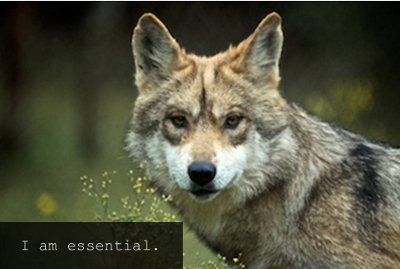Op-Ed: Changing management of wolves is a bad idea

- The New Mexico Game Commission, under Governor Martinez, has clearly become a tool of a small anti-wolf, anti-carnivore minority and its actions are out of touch with the majority of New Mexico voters who support wolf recovery and understand the important role top carnivores play in our ecosystems.
- The New Mexico Game Commission’s blatant hostility towards wolves is of even greater concern given that New Mexico Representative Steve Pearce has introduced legislation that would remove federal protections for endangered Mexican gray wolves. People who want to see our native wolves survive and recover should contact their representatives and urge them to vote against any bills or riders that undermine wolf recovery or the Endangered Species Act.
- Wolves are a benefit to the West and are essential to restoring the balance of nature. Actions to interfere with the Mexican gray wolf’s survival and recovery cheat us all of the opportunity to have wolves returned to their critical natural role.
- At last official count, only 110 Mexican gray wolves were found in the wild, making them one of the most endangered wolves in the world. Actions such as NM Game Commission’s unwarranted denial of the Ladder Ranch and USFWS permits will only further complicate efforts to recover these rare wolves.
- As the federal agency responsible for the recovery of endangered species, the U.S. Fish and Wildlife Service can and must move forward with releases of captive wolves, regardless of the Commission. The Service should be releasing entire families of wolves from captivity instead of deferring to state agencies that are clearly hostile to wolf recovery.
- US Fish and Wildlife Service must be able to release wolves into New Mexico to improve the dwindling genetic health of the wild population. The wild wolves suffer from inbreeding depression and can’t wait for politics or risky experimental techniques like cross-fostering.
- The federal government nearly drove the Mexican gray wolf to extinction in the 1900’s. We have a moral responsibility to do all we can to ensure these wolves do not go extinct and NM Game Commission is ignoring that sacred charge and their public trust responsibility.
- Mexican gray wolves are unique native animals. They are the rarest, most genetically distinct subspecies of gray wolf in North America and the most endangered wolf in the world. State and federal agencies should do all in their power to move these special wolves away from extinction towards recovery.
- The livestock industry has a responsibility to share public lands with wolves and other wildlife. Wolves are responsible for less than 1% of livestock losses and there are many tried and true methods to avoid conflicts between livestock and wolves. Responsible managers and livestock owners emphasize conflict avoidance instead of scapegoating wolves.
- Wolves generate economic benefits – a University of Montana study found that visitors who come to see wolves in Yellowstone contribute roughly $35.5 million annually to the regional economy. New Mexico stands to benefit from wolf-related tourism, but only if the Mexican wolf reintroduction is allowed to succeed.
- Thank the paper for publishing this Op Ed.
- Submit your letter as soon as possible. The chance of your letter being published declines after a day or two since the article was published.
- Do not repeat any negative messages, such as “so and so said that wolves kill too many cows, but”¦” Remember that those reading your letter will not be looking at the article it responds to, so this is an opportunity to get out positive messages about wolf recovery rather than to argue with the original article.
- Keep your letter brief, between 150-300 words.
- Include something about who you are and why you care: E.g. “I am a mother, outdoors person, teacher, business owner, scientific, religious, etc.” Don’t be afraid to be personal and creative.
- Provide your name, address, phone number and address. The paper won’t publish these, but they want to know you are who you say you are.
Contact the Governor’s office and request respectfully that she put an end to her Commission’s anti-carnivore state wildlife policies, grant the Mexican wolf permit to Ladder Ranch, and rescind the rule giving the Commission this authority.
Calls are most effective: 505-476-2200 The Governor’s office may try to tell you to contact the Commission. Please tell them politely, but firmly, that Governor Martinez is responsible for the actions of her Game Commission and your message is for her.
Email: http://www.governor.state.nm.us/Contact_the_Governor.aspx
You can also sign a petition to the Governor here.
Please contact U.S. Fish and Wildlife Service Director Dan Ashe as well.
Sample message:
I am calling to urge the U.S. Fish and Wildlife Service to exercise its federal authority over the Mexican gray wolf reintroduction and stop allowing state game commissions in New Mexico and Arizona to undermine wolf recovery. The Service should be doing all in its power to ensure the recovery of endangered Mexican gray wolves. This includes going far beyond risky cross-fostering. Please expedite the release of adult wolves and wolf families to improve the wild population’s genetic health.
Calls are most effective. Just tell whoever answers that you have a message for Director Ashe: 202-208-4717
Emails can be sent to dan_ashe@fws.gov



